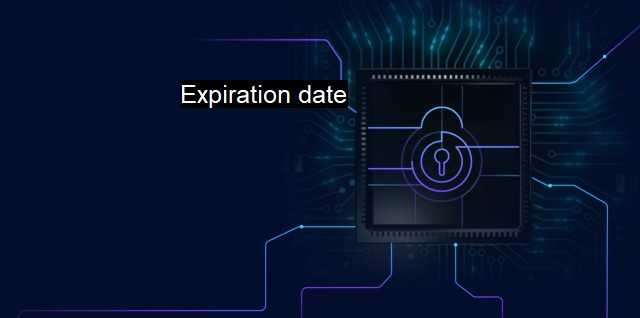What is Expiration date?
The Importance of Understanding Antivirus Software Expiration Dates in Cybersecurity: Why Your Computer and Data Depend on It!
"Expiration date" in the context of cybersecurity refers to the date and time a certain digital security tool expires after which it can no longer be relied on for protection. Just like various products on the shelves in your supermarket band together right from its production date to the final day of viability, the same rule applies to antivirus solutions and other such security measures. An expiration date is not unique to physical, edible goods; it reaches its claw into the very workings of our digital lives and delineates the time till which one can use specific digital tools.Numerous entities struggle with the challenge of expiration. Notably, digital certificates that encrypt online communications and affirm the identity of websites follow rules of expiration. the antivirus software that fortifies our digital devices against potential malware, ransomware, or any other security compromise also comes with its pre-set expiration dates. Without such mechanisms in place, we crumble into the pit of vulnerable digital existence.
Antivirus software essentially works by constantly updating itself to keep tabs on the newest types of attacks and viruses. The moment antivirus software passes its expiration date without any renewal attempts, it starts losing its ability to understand or recognize newer, potentially more dangerous, threats. Consequently, the risk of attacks and harm to your digital information reaches a new peak.
Security patches and updates that are so continually required by your software also have a role to play in expiration hazards. Updates are nothing but amendments to the software, fixing vulnerabilities and security loopholes, and silencing any scope of exploitation open to hackers. When any software, especially antivirus, passes its expiration date, the delivery of these updates and amendments stop abruptly—culminating in a more pronounced vulnerability to cyber threats.
Expired software, therefore, serves as an empty, defenceless gateway to possibly the most severe form of cyberattack: data breaches. These breaches can be defined as hackers gaining unauthorised access to sensitive information obtained from computer systems, primarily as a direct result of expired or weak protective tools such as antivirus software.
Renewing the software before its withdrawal is, therefore, the optimal means of staying protected in the amateur yet fierce arena of cyber vulnerabilities. It follows, logically, that understanding the pattern of subscription expiry on antivirus software becomes indispensable.
Most brands of antivirus software follow an annual or a biannual renewal scheme. Markets span high and low with numerous establishments that offer a variety of time spans to decipher what suits the customer the best. Premium services often offer extended subscriptions, reaching up and crossing deadlines of a whole year. They strike with specialized cybersecurity troops, working day in and day out, to keep software updated and resistant to threats.
Taking note of the expiration date provides certainty about one's digital security proficiency and strives to extend the protective armour to face the changing threats of the digital world. The renewal assessment before it ferociously expires, the continued implementation of updates, and maintenance of active anti-virus protocols can create a horizon away from the threats prevalent in the digital environment. Ignorance of the expiration dates thus chips away from the sculpted benefits that the subscription plans might otherwise offer us.
In the non-physical world of cybersecurity, 'expiration date' is a more realistic metaphor, delineating the impermanent bounds of digital security. It offers a model strategy against cyber vulnerabilities, threats, and risks. It is a clarion call to the masses indicating the termination of digital safety tools. The bottom line being, don't ignore the expiration date; anticipate it, acknowledge it, and most importantly, renew it. Through cognizance of time-bound digital tools, we may brace ourselves against an ascending array of cyber threats, sculpting ourselves a sanctuary on the planet of information technology.

Expiration date FAQs
What is an expiration date in the context of antivirus software?
An expiration date in the context of antivirus software refers to the date when the software's license or subscription expires. After this date, the software may not receive updates and will not be able to protect your device from newly emerging threats.What happens if I use antivirus software after its expiration date?
If you use antivirus software after its expiration date, the software may no longer be effective in detecting and protecting your device from new and emerging threats. Your device will become vulnerable to cyberattacks, and your personal and sensitive data may be at risk.Can I still renew my antivirus software after it has expired?
Yes, most antivirus software providers offer options to renew your license or subscription after it has expired. It is recommended to renew your antivirus software before it expires to ensure continued protection of your device and data.What should I do if I cannot renew my antivirus software after it has expired?
If you cannot renew your antivirus software after it has expired, you should consider switching to a different antivirus software provider to ensure continued protection of your device and data. It is important to have active and up-to-date antivirus software to protect against cyberattacks and threats.| | A | | | B | | | C | | | D | | | E | | | F | | | G | | | H | | | I | | | J | | | K | | | L | | | M | |
| | N | | | O | | | P | | | Q | | | R | | | S | | | T | | | U | | | V | | | W | | | X | | | Y | | | Z | |
| | 1 | | | 2 | | | 3 | | | 4 | | | 7 | | | 8 | | |||||||